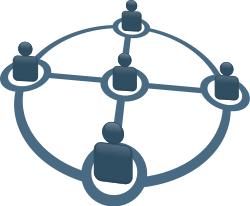Broadband technologies are fundamentally transforming the way we live. UN believes that communication is not just a human need – it is a right. The greater communication and understanding made possible through access to information and communication technologies. In today’s challenging economic climate, recent research has shown that broadband infrastructure and services contribute to economic growth and promote job creation.
UN wants two-thirds of the world online by 2015 article says: Freedom to communicate is a human right – as is having a broadband connection, the UN said today.
By 2015, internet user penetration should reach 60 per cent worldwide, 50 per cent in developing countries and 15 per cent in least developed countries. They want 40 per cent of households in developing countries to have internet access.
Governments should lift taxes on ICT services and free up radio frequency spectrum to fuel an expansion of networking, the UN recommends in its Broadband Challenge issued on Tuesday. Businesses should work out some smarter business models and the prices should come right down.
Connectivity is necessary, but not sufficient. Hand in hand with the roll-out and deployment of broadband networks, it is vital to develop new services, personalized applications and fully multilingual content to ensure that everyone finds their place in the global village online.
If this vision holds there will be lots of work for people that build and maintain the needed access networks. And there there will be lots of work to create that multilingual content.

5 Comments
Tomi Engdahl says:
The world’s population is has hit seven billion.
The world at seven billion article at
http://www.bbc.co.uk/news/world-15391515
gives information how the number of people have increased over years.
The number of people on Earth has more than doubled in the last 50 years. Where do you fit into this story of human life? Fill in your date of birth to this web page to find out.
Tomi Engdahl says:
The New Digital Divide
http://www.nytimes.com/2011/12/04/opinion/sunday/internet-access-and-the-new-divide.html?_r=1&pagewanted=all
Telecommunications, which in theory should bind us together, has often divided us in practice. Until the late 20th century, the divide split those with phone access and those without it. Then it was the Web: in 1995 the Commerce Department published its first look at the “digital divide,” finding stark racial, economic and geographic gaps between those who could get online and those who could not.
Over the last decade, cheap Web access over phone lines brought millions to the Internet. But in recent years the emergence of services like video-on-demand, online medicine and Internet classrooms have redefined the state of the art: they require reliable, truly high-speed connections, the kind available almost exclusively from the nation’s small number of very powerful cable companies. Such access means expensive contracts, which many Americans simply cannot afford.
High-speed access is a superhighway for those who can afford it, while racial minorities and poorer and rural Americans must make do with a bike path.
Just over 200 million Americans have high-speed, wired Internet access at home, and almost two-thirds of them get it through their local cable company. The connections are truly high-speed: based on a technological standard called Docsis 2.0 or 3.0, they can reach up to 105 megabits per second
According to numbers released last month by the Department of Commerce, a mere 4 out of every 10 households with annual household incomes below $25,000 in 2010 reported having wired Internet access at home, compared with the vast majority — 93 percent — of households with incomes exceeding $100,000.
These numbers are likely to grow even starker as the 30 percent of Americans without any kind of Internet access come online.
Tomi Engdahl says:
A Quarter of the EU Has Never Used the Web
http://tech.slashdot.org/story/11/12/15/0343242/a-quarter-of-the-eu-has-never-used-the-web
Reuters reports that a quarter of the EU has yet to use the internet.
http://www.reuters.com/article/2011/12/14/us-eu-internet-idUSTRE7BD1BM20111214
Almost a quarter of the European Union’s 500 million people have never used the Internet and there is a widening division between the web-savvy north of Europe and the poorer south and east, figures released on Wednesday showed.
The full report created by Eurostat:
Internet access and use in 2011 Almost a quarter of persons aged 16-74 in the EU27 have never used the internet
http://europa.eu/rapid/pressReleasesAction.do?reference=STAT/11/188&format=HTML&aged=0&language=EN&guiLanguage=en%3C/p%3E
Phillip Seeney says:
I’ve read some good stuff here. Definitely price bookmarking for revisiting. I surprise how a lot effort you place to create this type of magnificent informative website.|
Tomi Engdahl says:
Broadband too costly in developing countries, says ITU
http://www.theregister.co.uk/2012/09/24/itu_2012_broadband_report/
In a new report that digests international broadband policies, the ITU has found that services remain too expensive in many countries.
The ITU’s Broadband Commission report has found that in 19 of the world’s least developed economies – mostly in Africa – the cost of broadband exceeds average monthly earnings.
That contrasts with the Commission’s target for entry-level broadband services to cost five percent of average earnings by 2015.